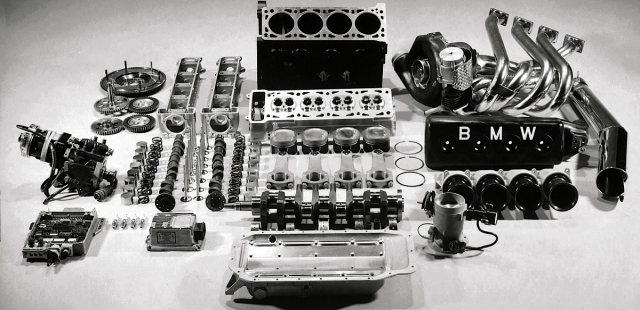This story has been around for years and was popularized for mainstream audiences in 2004 when a British documentary-style TV show titled “Massive Engines” recounted the development of BMW’s famed 1,500-horsepower 1.5-liter Formula 1 engine in the ’80s. As the legend goes, BMW engineers wanted to build their F1 engine around the venerable M10 4-cylinder architecture, which was introduced in the ’60s. This strategy could be used to help market the company’s production vehicles by demonstrating the durability of OEM components.
 But engineers in those days knew that a new factory casting could be suspect in surviving the forces generated by 11,000 rpm and 50-plus pounds of boost in race trim with reportedly close to 80 pounds for qualifying. (That’s where the 1,500-horsepower numbers come from, and there are stories that BMW welded the wastegates closed for qualifying!). Fears of core shift, porosity and thin walls were always a concern to engine builders when using high-volume-production castings. So, the engineers adapted a policy to use only blocks that had been driven around a 100,000 miles with no problems. The theory being, any problems would have surfaced by then, and the blocks would be suitable for the additional machining needed for racing. BMW even left the blocks outside to weather the elements for a few months, again with the goal of “seasoning” the block to eliminate any internal casting stress and stabilize all the dimensions. And finally, BMW engineers reportedly relieved themselves on the blocks, either as a sign of good luck or there was a scientific premise that warranted testing. After all, ancient sword makers used to quench hot metal in urine, and sometimes blood, as a way to treat steel.
But engineers in those days knew that a new factory casting could be suspect in surviving the forces generated by 11,000 rpm and 50-plus pounds of boost in race trim with reportedly close to 80 pounds for qualifying. (That’s where the 1,500-horsepower numbers come from, and there are stories that BMW welded the wastegates closed for qualifying!). Fears of core shift, porosity and thin walls were always a concern to engine builders when using high-volume-production castings. So, the engineers adapted a policy to use only blocks that had been driven around a 100,000 miles with no problems. The theory being, any problems would have surfaced by then, and the blocks would be suitable for the additional machining needed for racing. BMW even left the blocks outside to weather the elements for a few months, again with the goal of “seasoning” the block to eliminate any internal casting stress and stabilize all the dimensions. And finally, BMW engineers reportedly relieved themselves on the blocks, either as a sign of good luck or there was a scientific premise that warranted testing. After all, ancient sword makers used to quench hot metal in urine, and sometimes blood, as a way to treat steel.
 Whether any of the individual tactics actually contributed to the block’s durability, the overall strategy certainly worked. The BMW M12/13 engine is regarded as one of the greatest engines ever in Formula 1 history, powering teams from Bennetton, Brabham and Arrows. The engine became obsolete in 1988 when F1 banned turbos. But now that Formula 1 is moving to 1.6-liter turbocharged V6 engines for 2014 (with significant boost and fuel restrictions), there is renewed interest in the BMW history and the fables associated with the engine and turbo era. All or parts of the “Massive Engines” episode with Chris Barrie have been picked up by a number YouTube channels, and the forum boards routinely revive the myth when discussing block choice and preparation. It was even discussed in depth on the F1Technical board, offering a theory that the high levels of ammonia in urine provide nitrogen — and you’ve heard of nitriding.
Whether any of the individual tactics actually contributed to the block’s durability, the overall strategy certainly worked. The BMW M12/13 engine is regarded as one of the greatest engines ever in Formula 1 history, powering teams from Bennetton, Brabham and Arrows. The engine became obsolete in 1988 when F1 banned turbos. But now that Formula 1 is moving to 1.6-liter turbocharged V6 engines for 2014 (with significant boost and fuel restrictions), there is renewed interest in the BMW history and the fables associated with the engine and turbo era. All or parts of the “Massive Engines” episode with Chris Barrie have been picked up by a number YouTube channels, and the forum boards routinely revive the myth when discussing block choice and preparation. It was even discussed in depth on the F1Technical board, offering a theory that the high levels of ammonia in urine provide nitrogen — and you’ve heard of nitriding.
In fact, the argument of seasoned vs. new when selecting iron cylinder blocks has been around since the aftermarket started providing product. There were even caveats for selecting used blocks; such as, never use a block pulled from a cop car or taxi as they didn’t cool down often enough to be worthwhile. Today, there have been considerable advances in casting methods, temperature control and metallurgy — in addition to near-perfect machining operations — that working with seasoned blocks is no longer necessary in racing. Teams may experiment with additional treatments, such as cryogenics or running hot oil through the block during honing, but there’s no need to scour junkyards anymore and certainly no reason to schedule restroom breaks outside the shop.


















